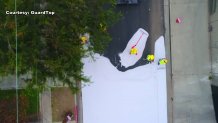Some U.S. cities are experimenting with reflective pavement coating to cool hot streets while the two largest North Texas cities have rejected those street coatings.
In this heatwave, pavement bakes to an even higher temperature than the air. Hot pavement, spread over an entire city, helps create what is called an urban heat island effect.
Darker asphalt is even hotter than hot concrete because the darker color absorbs heat.
Dallas Civil Engineer Tom Witherspoon knows about pavement, but it does not take an expert to know what his feet can tell him in this brutal heat.
Get DFW local news, weather forecasts and entertainment stories to your inbox. Sign up for NBC DFW newsletters.
“I know concrete. If I walk barefoot on that, I'm going to burn my feet. But, with asphalt, it's even hotter and it's an even greater problem,” Witherspoon said.
Four years ago, NBC 5 reported on a City of Los Angeles experiment with reflective pavement coating on selected streets. Los Angeles concluded that reducing heat from hot streets is a matter of public health because heat illness is an issue there all year.
"The pavement hasn't changed in 50 years, and so it's good for all of us to open our minds to some new possibilities," said Greg Spotts with the Los Angeles Public Works Department.
Local
The latest news from around North Texas.
On a sunny day, he demonstrated how a section of asphalt pavement was 130 degrees while an adjacent coated section was 118 degrees.
Los Angeles is now expanding the coated street experiment to all the streets in an entire neighborhood. The City of Phoenix, Arizona, is also using reflective coating on some streets to reduce heat.

“I have questions. Like, how long will it last? Because you're driving cars over it. How well will it bond with the asphalt?” Witherspoon asked.
Sure enough, The City of Dallas provided a statement saying other options are being considered, instead.
“The public works department has looked at 'cool' pavement previously, but as the maintenance was a great challenge, the concept was not pursued. However, we are currently evaluating alternative materials for street and alley pavements. More work needs to be done,” the Dallas statement said.
The City of Fort Worth said reflective coating was annoying to drivers.
“The City of Fort Worth moved away from white or bright colored surface material because of the reflectivity. After receiving several complaints from residents it was determined that darker-colored (non-glare) pavements were easier on the driving public. We are continuously researching new types of pavement and coating that we believe may be beneficial to our residents, but have not found one that reduces glare for drivers to our standards,” the Fort Worth statement said.



